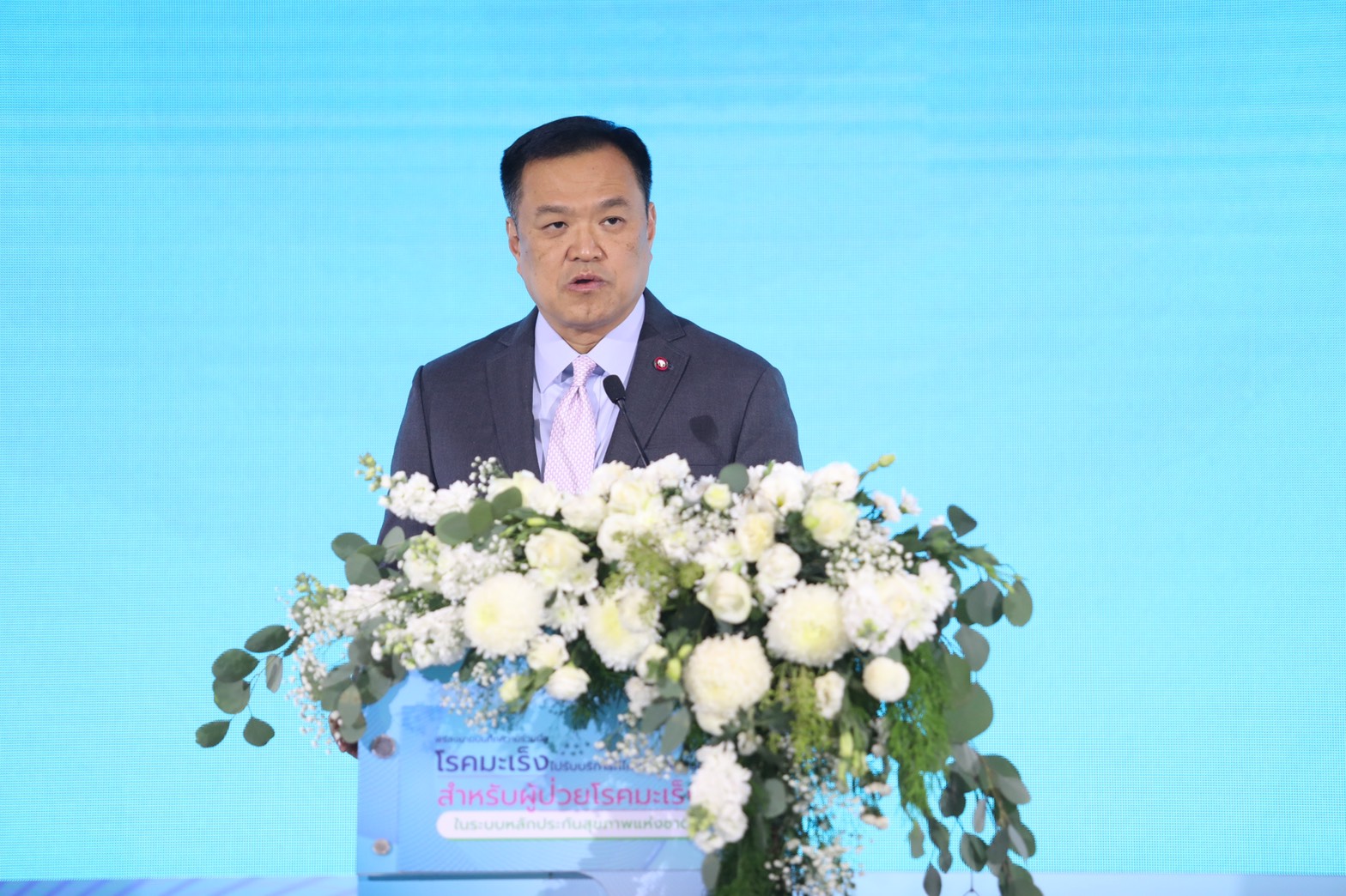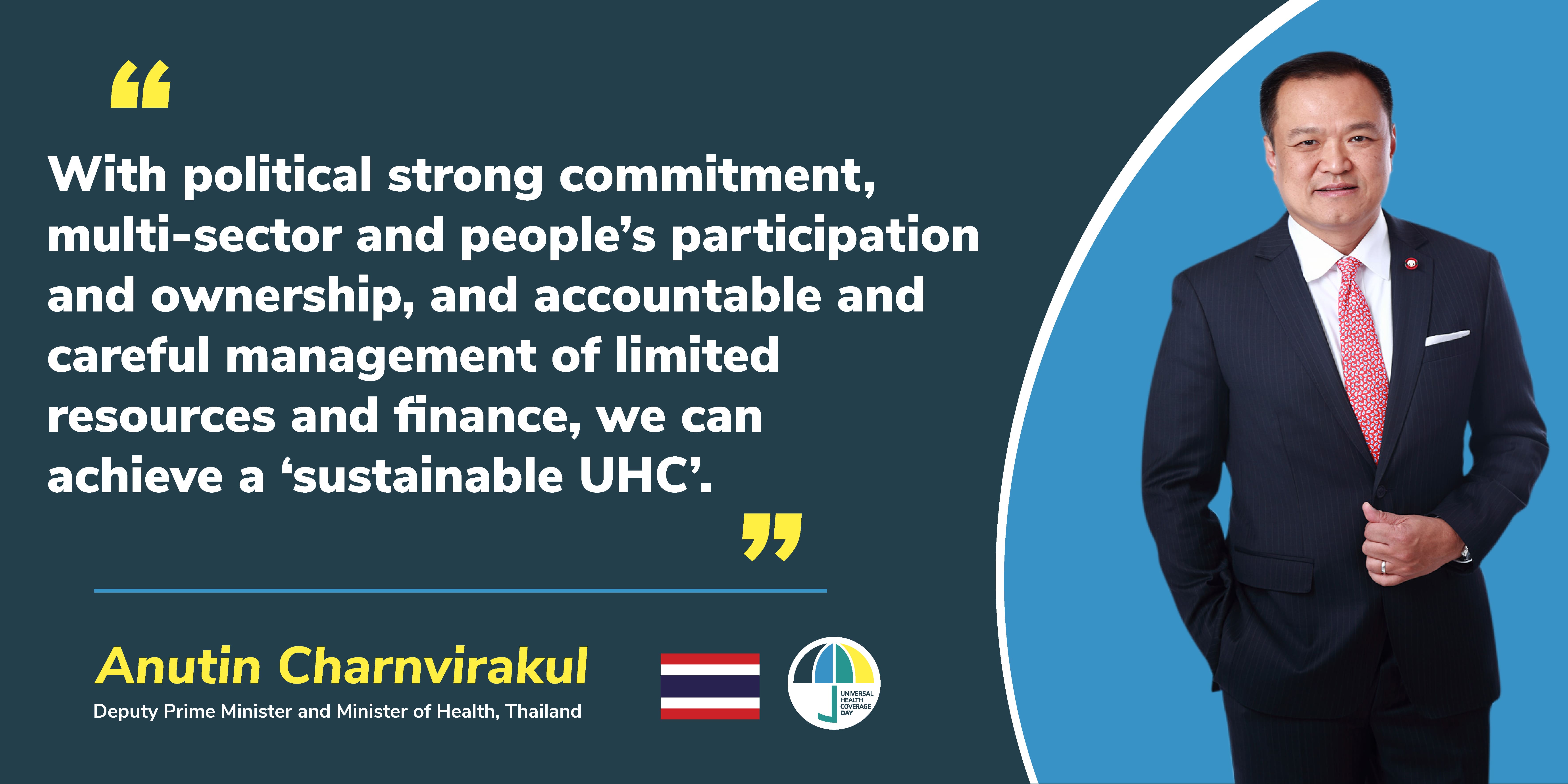
- Home
- DescriptionNews
Start the journey to Universal Health Coverage (UHC) now.

Anutin Charnvirakul
Deputy Prime Minister of Thailand and the Minister of Public Health
The year 2020 slipped away as many of us had spent time in isolation during the coronavirus lockdown. But it was also a memorable year, with a lot of lessons learned, for us who witnessed our country bearing the fruit of long-year investing in the Universal Healthcare Coverage (UHC).
Thailand was the country with the first confirmed coronavirus case outside China. The virus reached Thailand before mid-January, following by the first reported local transmission confirmed on 31 January.
We remember the chaotic situation when the confirmed cases surged to over a hundred per day after we had found the transmission clusters in Bangkok’s center in mid-March.
Most of those days went with patients crowding the hospitals. Medical staff worked tiredly in the wards. Personal Protective Equipment was in shortage. People were confused by fake news on social media. It was a novel virus for us at the time, so we didn’t fully understand it.
It took us a few months to learn how to handle the pandemic, and eventually, departed from the stage of chaos. By the end of mid-May, local transmission cases fell to near zero. Thailand has currently reported less than 4,000 cases and 60 deaths, despite its 70 million population and nearly 40 million visitors a year.
When we look back to the past months, we are certain that the UHC played a big part in guiding us throughout the most difficult time.
Introduced in 2002, the UHC has allowed Thailand to mobilize resources such as health workforces and finance to tackle COVID-19. When the UHC is coupled with the availability of healthcare infrastructure---a result of Thai governments’ effort to build healthcare facilities and networks of health workers and volunteers in the last 40 years--- we could effectively control and prevent the spread of coronavirus in a short period of time.
The UHC has also enabled us to provide free COVID-19 testing to everyone living in Thailand, including foreigners and migrant workers who are essential to our economy.
Though this great achievement, our journey toward the UHC is not an easy path. It was an arduous process that required years of trial and error, collective efforts, and hard-working people who dedicated their lives to make the UHC happened.
This process was kicked off from our will to see everyone in Thailand being protected. It is an endless process, and we are far from perfect even though we are often portrayed as a success story. There is still room for improvement in our health system---including strengthening primary care, increasing service efficiency, and expanding the UHC coverage to high-cost diseases.
As the International Universal Health Coverage Day on 12 December is coming soon, we have seen an ongoing movement calling for strong health systems that “protect everyone." It does not just remind us of where we began our journey toward UHC, but also, the world’s progress to achieve "health for all."
World Health Organization estimates that at least half of the world’s population still don’t have full coverage of essential health services. Over 800 million people spend at least 10 percent of their household budgets to pay for health.
To address this challenge, in 2015, the UHC became one of the United Nations (UN)'s Sustainable Development Goals to be achieved by 2030. This led the UN member states to adopt the most ambitious high-level political declaration in 2019 when country leaders promised to invest more in healthcare and ensure access to essential health services.
World Health Organization and countries having experience in building health system have provided supports, resources, and know-how to countries setting goals to introduce the UHC, so they don’t need to build it from scratch. Of course, political will, long-term commitment, and patience are still necessary recipes for the journey toward the UHC.
Our struggle to survive the coronavirus pandemic proves that the world can’t avoid that journey. Ensure Access to free healthcare will increase the world's and people's resilience to future crises, either health or financial crises that will likely reemerge and disrupt our lives again.
We encourage everyone to start the journey now. If not now, then when?


